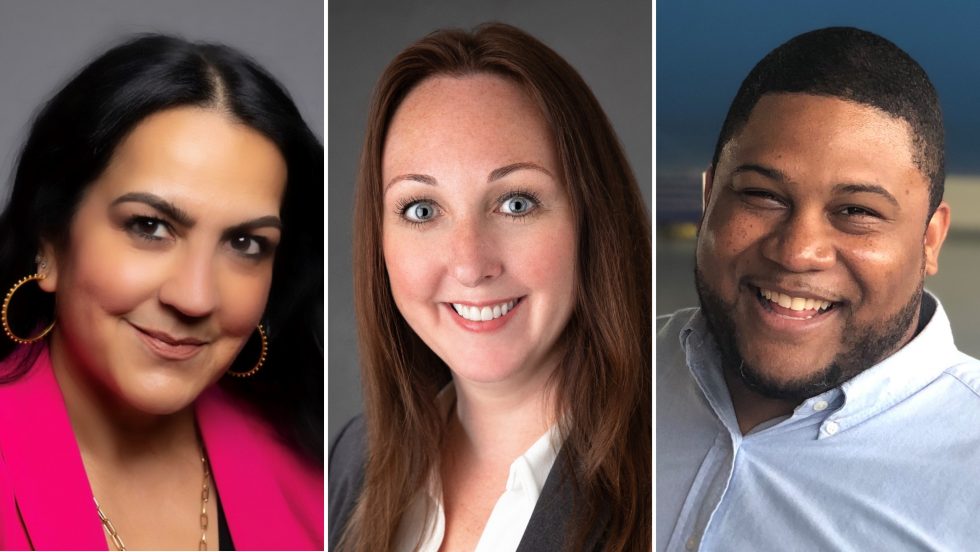
Emphasizing the importance of corporate social responsibility is part of the mission of the Robert B. Willumstad School of Business. A panel of experts from the business and nonprofit worlds came to campus to share their insights with students.
Never has it been more important for a business to demonstrate to employees, stakeholders and the public that it is ethical. According to a study in the journal Sustainability, when Generation Z customers have a positive perception of a company’s corporate social responsibility (CSR), they may be willing to pay more for that company’s products or services. Another study by the World Economic Forum found that Gen Z cares more about sustainability than anyone else and that they are influencing other generations to feel the same.
“These surveys suggest that more graduates are choosing where to work based on a company’s CSR profile, and we are seeing a trend in that direction at Adelphi,” said MaryAnne Hyland, PhD, dean of the Robert B. Willumstad School of Business.
In keeping with the mission of Willumstad School—to develop students who are socially responsible—Adelphi presented “Doing Well by Doing Good” on November 9 as part of the Insights From Experts series, which brings entrepreneurs, executives and other industry professionals to the campus to share their insights and experiences.
Bridging Academic Experience With the Business World
“The theme of corporate social responsibility is one that is central to us,” said Dr. Hyland, who served as moderator. “We’re proud to present an event that speaks to the essence of that. Exposing students to experts in the field is an important aspect of bridging students’ academic experience with the business world.”
The panelists were:
- Renu Dalessandro, chief marketing officer at the nonprofit Jovia Financial Credit Union and a recent appointee to the President’s Advisory Council at Adelphi.
- Sarah Gitter ’06, member of the Willumstad Dean’s Advisory Board and senior internal auditor at Sensiba, an accounting and financial advisory firm and a B corporation certified for its social and environmental performance, transparency and accountability.
- Corey Manning, marketing engagement associate manager, corporate social responsibility, at Henry Schein, a Fortune 500 company that is the world’s largest provider of solutions for healthcare professionals and is ranked No. 1 in its industry for social responsibility by Fortune magazine.
Each panelist stressed the importance of transparency when discussing how companies serve their communities and the need for students to thoroughly research corporations and organizations to combat greenwashing—a marketing tactic some companies use to appear more environmentally responsible than they really are.
The Importance of Giving Back to the Community
“We have a rule at Henry Schein: If we take care of our community, we’re going to do just fine in business,” Manning said. He touted the Henry Schein Cares Foundation as a successful CSR initiative that provides underserved communities with greater access to dental services and other forms of healthcare. “We take our responsibility and impact on the community very seriously,” he said. “We operate in 33 countries and have over one million customers, but we’re a global company that acts locally.”
Dalessandro highlighted Jovia’s Financial Literacy Program, which partners with Adelphi, among other institutions, and a Diversity, Equity and Inclusion Committee formed in 2020 that has enhanced the company’s relationship with employees, business partners and the community. “We give benefits back to the community—that’s the beauty of a not-for-profit,” she said. “We are embedded in the community, and we talk to people in the community to make sure they have a voice, because our company is member operated and member owned.”
Gitter described Sensiba as “a people-first company that strives to enhance the lives of our employees. Our workplace culture is based on the golden rule: We treat people the way we want to be treated. Our emphasis on CSR has improved employee retention and employee engagement in the community.” She also noted a company initiative that provides internships to high school students from low-income backgrounds.
As CSR becomes a bigger factor in Gen Z’s career decisions, Adelphi students benefit by hearing from experts representing markedly different companies.
“We wanted to have a diverse panel,” Dr. Hyland said. “Sarah and Corey work for for-profit institutions. Henry Schein is quite large, and Sensiba is much smaller. Also, the fact that Sensiba is a certified B corp made Sarah a great choice. Jovia being a not-for-profit brought an entirely different perspective since, as Renu said, CSR is part of Jovia’s DNA.”